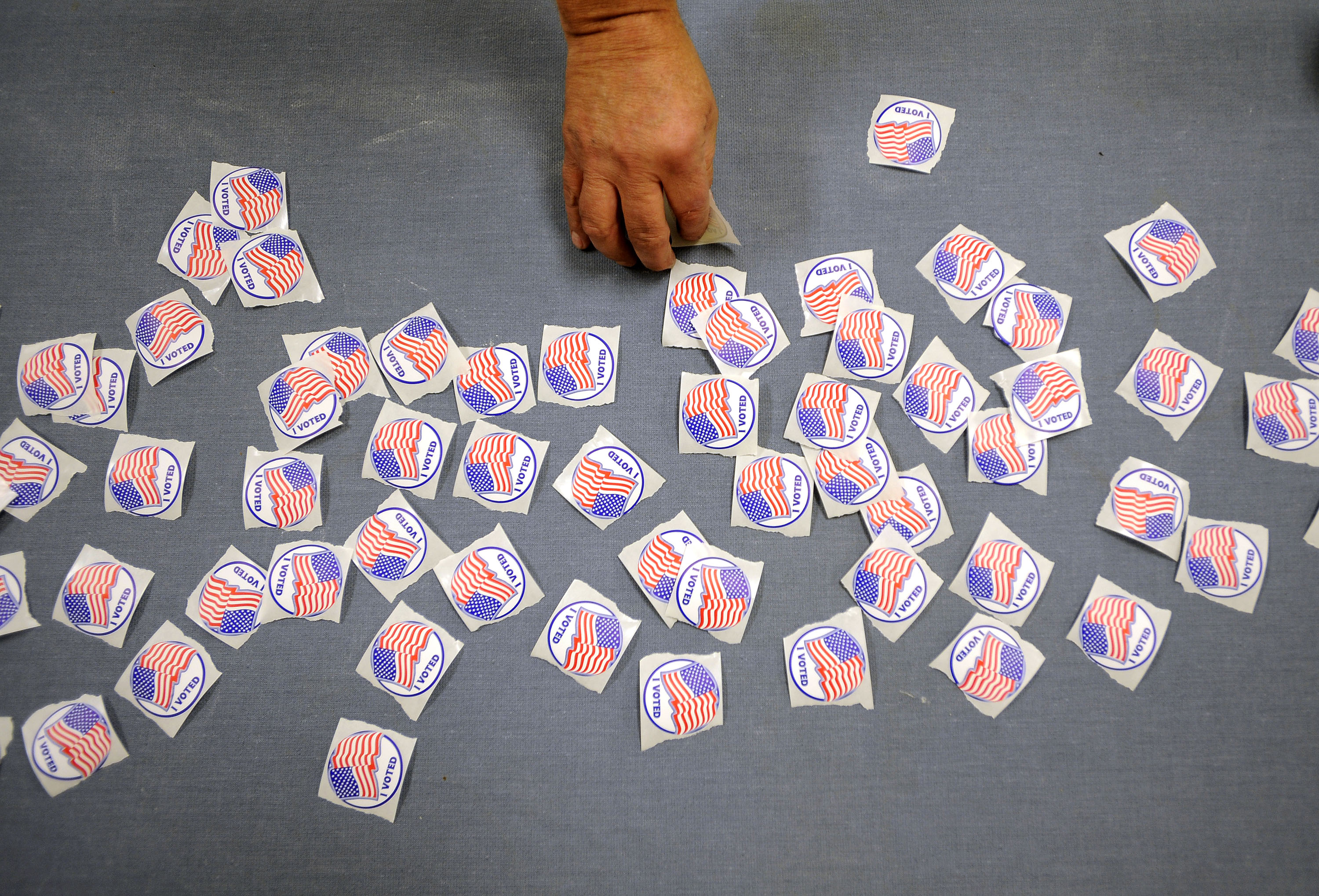Could the 2016 Election Settle the Voter ID Debate?

A voter grabs a sticker after voting in Augusta County, Va. on Tuesday Nov. 3, 2009. (AP Photo/The News Leader, Pat Jarrett)
As the 2016 election season officially kicks off next week, beginning with the Iowa caucus on Monday, voters in several states are preparing to cast ballots under stricter laws for the first time.
Over the past five years, more than 18 states have passed laws to impose restrictions on voters’ access to the ballot, according to a FRONTLINE analysis of voting laws nationwide. Even as at least six states have expanded access to the ballot, introducing automatic voter registration and online voting, these states have cut early-voting hours, limited felons’ ability to vote and imposed strict voter ID laws. That includes several key swing states, such as North Carolina, which passed a comprehensive voting bill in 2013, and Ohio, which passed a law to reduce early-voting days one year later.
The most controversial of these laws are those requiring identification at the polls — usually a photo ID. That’s largely because support is split along partisan lines. Republicans tend to favor them, arguing the laws guard against voter fraud. Democrats, meanwhile, have pointed out that new restrictions are more likely to prevent some voters, in particular African-Americans and Latinos, from casting ballots.
Several of these laws were passed in the wake of the Supreme Court’s 2013 decision to overturn a key provision of the Voting Rights Act, which blocked states with a history of discrimination from imposing laws that federal officials found discriminatory. After that decision, five of those states — Alabama, Mississippi, North Carolina, Texas and Virginia — implemented voter ID laws, bolstering critics’ concerns and in some cases, spurring court challenges.
There’s little evidence of much voter impersonation fraud — when people misrepresent themselves at the polls — although proponents of these laws argue that even one case is cause for concern. A 2012 analysis by News21, a journalism project at Arizona State University, found 10 cases of voter impersonation fraud since 2000.
But the disparate impact of voter ID laws — whether they prevent people from voting — has also been difficult to measure. Several states have estimated how many people might be disenfranchised by their laws — usually hundreds of thousands of voters. But tracking those who were discouraged from showing up or turned away at the polls is more complicated. The best attempt so far, an analysis by the Government Accountability Office in 2014, found that from 2008 to 2012, turnout declined by a few percentage points more in two states, Kansas and Tennessee, once they imposed voter ID laws, than in other states.
This election may present the best test yet of the laws’ true impact. Voters in 10 states will have to comply with stricter ID requirements at the polls than they faced in 2012, the last presidential election.
That has voting rights advocates planning to watch carefully to see what happens. “The number of people that could be confused or outright disenfranchised or deterred is much greater” than before, said Myrna Perez, director of the Brennan Center’s voting rights and elections project.
Alabama passed a law in 2011 requiring a photo ID, but federal officials blocked it from taking effect until after the Supreme Court’s Shelby ruling. Mississippi‘s photo ID law was awaiting approval when the Shelby decision came down. Both states’ laws took effect in 2014.
Virginia‘s law strengthening ID requirements at the polls took effect the same year. Tennessee passed a voter ID law in 2011, but further tightened its rules in 2013.
North Carolina‘s photo ID law takes effect for the first time this primary election. Amid a court challenge, officials have amended the law to allow voters who don’t have an acceptable photo ID to cast a provisional ballot. The state is still defending the photo ID requirement and a number of other voting changes passed in 2013 in court.
In New Hampshire, whose first-in-the-nation primary comes eight days after the Iowa caucus, a photo ID law that was passed in 2012 takes effect this year.
Rhode Island passed its law in 2011, but only began to require a photo ID in 2014.
Wisconsin’s voter ID law, passed in 2011, has survived a string of legal challenges and will be in effect for the first time in a general election this year.
In North Dakota, a bill passed by lawmakers last year tightening requirements for identification at the polls, is currently in effect. Last week, members of the Turtle Mountain Band of Chippewa filed a legal challenge to the law, arguing that it disproportionately burdens Native Americans in the state.
In Texas, the state’s new voter ID law was declared unconstitutional by a federal court in 2014. Texas appealed, and the courts have allowed the law to remain in effect until the federal appeals court makes a final ruling on the law. Voters were required to show a photo ID for the 2014 midterm elections, but this will be the first general election under the new rules.
One More State?
Most of the states that had the political will or ability to pass voter ID laws have already done so, Perez said. But there’s one more state that advocates say may be able to pass such a bill this year.
In Missouri, the House passed a voter ID bill this month that would ask voters to amend the state Constitution to require photo IDs at the polls. The state’s Supreme Court declared a previous voter ID law unconstitutional in 2006.
An analysis by the state’s Secretary of State found that such a law could disenfranchise an estimated 220,000 voters. It also said it hadn’t received any reports of voter impersonation fraud in the state.
The bill’s sponsor, Rep. Tony Dugger, didn’t respond to multiple calls and emails seeking a comment. The legislation is now with the state Senate.





